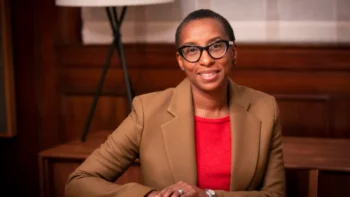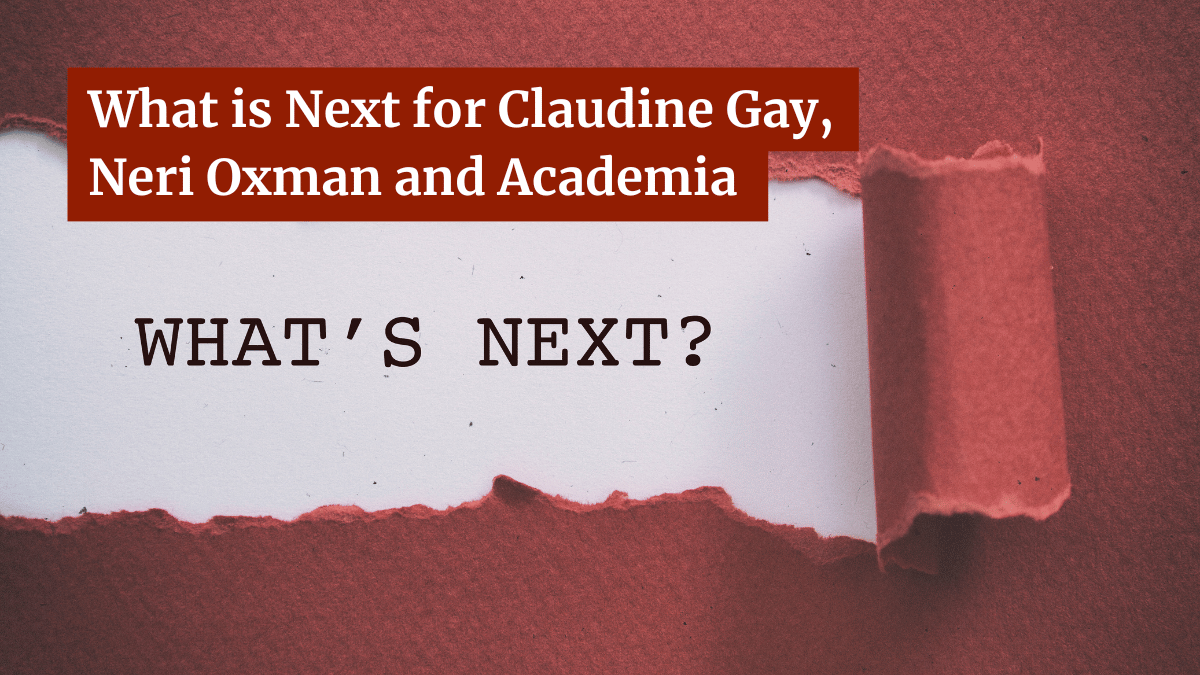What is Next for Claudine Gay, Neri Oxman and Academia

On January 3, Claudine Gay resigned as the president of Harvard, ending a month-long controversy that included multiple allegations of plagiarism in her previous work.
Though many of those allegations did not hold up to scrutiny, several were serious enough to warrant corrections in previous papers and it was clear that her detractors, including hedge fund CEO Bill Ackman, were not going to rest until she resigned.
The next day, Business Insider published accusations that Ackman’s wife, Neri Oxman, had plagiarized in her dissertation. Later came allegations that she plagiarized verbatim passages from Wikipedia and the latest allegations claim she plagiarized from disgraced concussion researcher Paul McCrory.
Ackman has threatened to sue Business Insider for the allegations, but the publication stands by the story.
Though the stories are still very much unfolding, both have caused a great deal of anxiety in academia. Both Oxman and Gay were targeted by these investigations not because they were suspected of plagiarism, but they were political and ideological targets where plagiarism was an expedient way to damage their reputations and careers.
So that begs a simple question: What is next for both Gay and Oxman? Likewise, what is next for academia as the plagiarism war threatens to become much broader?
To answer that, let us look at each party one at a time.
What’s Next for Claudine Gay

Claudine Gay resigned from her post as president of Harvard on January 3. That was the final act of a month-long plagiarism scandal that ended her brief time in the position.
However, Gay’s resignation did not mean that she was out of a job. As she announced at the time, she instead is returning to her position as a faculty member at the school.
Before she was appointed president, Gay was Faculty of Arts and Sciences dean, where she earned nearly $900,000 per year. Though her announcement didn’t have any details on whether she would return as dean, she will almost certainly be a faculty member at that college.
That is at least partly because Gay has tenure at the school, which means that her position enjoys greater protection than that of non-tenured professors or even school presidents. Though Harvard could, theoretically, begin the process to dismiss her, most see that as unlikely and, even if they did, it would likely take over a year to complete and dismissal is far from a certain outcome.
As such, this is most likely where Gay’s story will end. Though Gay has been a highly controversial figure as president of the school, especially after her December 5th testimony before the Committee on Education & the Workforce, as just a member of the faculty, she is much less of a lightning rod, even if she returns to the dean position.
Though her brief tenure as president will likely be what she is best known for by those outside academia, she seems likely to back go back to her previous, much less headline-grabbing career.
What is Next for Neri Oxman?

Neri Oxman’s situation is different from Gay’s for two reasons. First, she is no longer active in academia and, despite claims that it is harming her career, does not seem to be in any danger of losing the positions that she does hold.
For her, the immediate danger is more indirect and deals with harm to her reputation and how that may impact future opportunities. However, given the fact she has many prominent and high-profile supporters, including her husband, it does not seem likely that she will be wont for opportunities.
The other difference is that her scandal involves just one document, her dissertation. This was the document she used to receive her Ph.D. from MIT in 2010.
MIT could, theoretically, open an investigation into that dissertation and, if they found that the plagiarism was severe enough, could revoke her degree. We have seen cases of this in the past including Senator Joe Walsh losing his degree from the Army War College in 2014 and former German Education Minister Annete Schavan losing her Ph.D. in 2013.
However, in the United States, such revocations are incredibly rare. In 2014, Stanford Graduate School of Business revoked the degree of Mathew Martoma, who was found guilty of insider trading and later discovered to have falsified his transcripts when applying for the school. It was believed to be the first time the school had revoked a degree in its history.
The reason for this are simple: The process of revoking a degree is long and expensive, even under the best of circumstances. Much like the process of firing a tenured professor, the process can take months or years and can involve assembling a committee, bringing in outside experts, holding multiple hearings and then repeating much of that process across several appeals.
However, even after a school does decide to revoke the degree, the case is then likely to result in litigation, which results in the issue being retried before a court of law. That, in turn, means more money, more time and more energy spent, even if courts, generally, side with universities in such disputes.
The most likely outcome for Oxman is simply nothing. MIT is unlikely to seriously investigate this dissertation as there is no real motive for them to do so. However, if the allegations and/or the outcry become too overwhelming, they will more likely reach an agreement with Oxman to let her keep her degree if she fixes the issues in the paper.
Granted, MIT is unusual in that this scandal could cause serious harm to their reputation. As such, they could consider the risk of an investigation worthwhile, especially considering that Ackman has already taken a hostile stance toward them, threatening to investigate all their faculty.
Still, it is much more common for such allegations to simply be ignored or resolved peacefully than to come to the revocation of a degree.
What’s Next for Academia
Academia, to put it mildly, is on edge. University presidents, in particular, are concerned about potential plagiarism in their previous works. Many of them have academic careers that span decades and much of their work either predates or simply was not checked for plagiarism at the time it was submitted. They are worried about any mistakes that they might have made.
That said, much of what happens next depends on Ackman himself. If Ackman makes good on his threat to analyze every faculty member at MIT, we could see a significant escalation of the weaponization of plagiarism.
However, such an investigation would either be incredibly time and resource consuming or be shoddy in nature. Performing such a large number of checks would likely be one of, if not the single, largest undertaking in plagiarism checking history. This is because MIT has over 1,000 faculty members and many have multiple works that would need to be investigated.
For comparison, the Vroniplag Wiki, which used crowd sourcing among academics to perform a large number of checks of German academic papers, published findings on some 162 works over the course of its first five years. The organization only publishes findings where plagiarism is found, however, it also only investigates cases where plagiarism is suspected. This has been seen by many, including myself, as an amazing feat.
An investigation of all of MIT’s faculty would, most likely, be an order of magnitude bigger than what even Vroniplag has been able to do. Without either an even larger crowdsourcing effort or a severe reduction in the quality of the investigation, such an investigation would likely be time prohibitive.
As such, despite the bluster, it is most likely that such checks will remain relatively targeted. That said, the scope of that targeting is clearly being widened and university administrators have no way of knowing when or if they will find themselves in the crosshairs.
That has created a great deal of anxiety for administrators, many of whom have begun quietly checking their past work. That may become a new normal, at least for the time being.
Bottom Line
For both Gay and Oxman, these scandals are certainly not good and have harmed both their reputation and at least some of their prospects. However, both seem to be protected from too dire of consequences and neither case is likely to fully end their careers.
In short, they both will likely move on with time.
However, as I said in my previous post, academia is understandably worried about the prospect of a shooting war escalating to a nuclear war. Though time and resource constraints make it unlikely that it will get too broad, the concern is that accusers will not care about the veracity of their claims and will publicize every plausible-sounding allegation.
Not only will that wrongly damage reputations and careers, but it risks devaluing the concept of plagiarism as an academic sin. Eventually the public and even academia will become desensitized by the claims and plagiarism allegations, no matter how legitimate, become less meaningful.
How likely that is will depend on the next steps taken by Ackman and others. However, even if it ends here, academics have certainly been given a great deal to think about moving forward as these cases likely won’t be the last of their kind.
Want to Reuse or Republish this Content?
If you want to feature this article in your site, classroom or elsewhere, just let us know! We usually grant permission within 24 hours.
